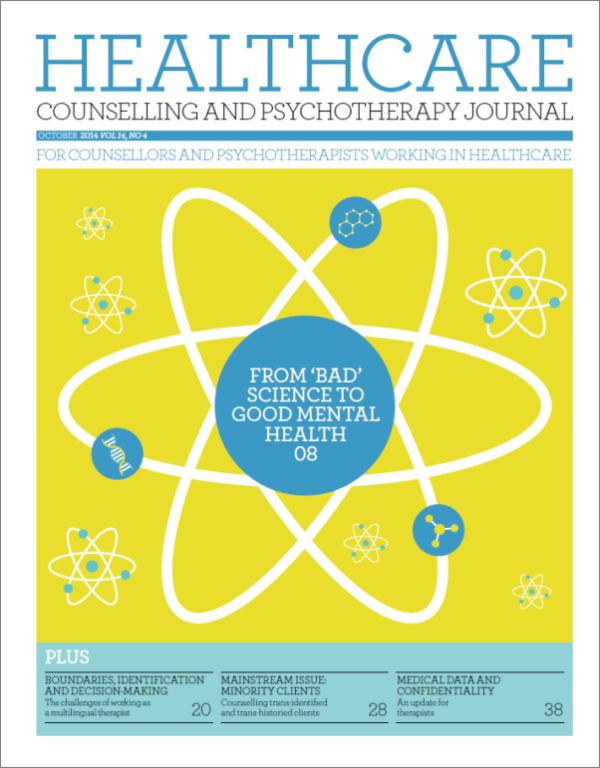In this issue
Features
From ‘bad’ science to good mental health (free article)
Martin Seager offers an alternative to the prevailing scientific culture of talking therapies: a psychologically minded framework that demonstrates the true value of counselling
Moving from psychiatric beds to community recovery
Michael Lilley outlines his vision for the next stage in the transformation of mental health services in England
‘You can call me Betty’
Boundaries, identification and decision-making: Beverley Costa explores how the challenges of working as a multilingual therapist offer lessons for us all
New framework for supervisor training
To provide consistent standards for supervisor training and link training to evidence-based practice, BACP has launched a new supervision training curriculum. Helen Coles reports
Mainstream issues: minority clients
Tina Livingstone offers a perspective on counselling trans-identified and trans-historied clients
The role of the ophthalmic nurse counsellor
Louise de Board and Jasmine Thombs describe their work with patients undergoing removal of an eye after traumatic injury
Care.data: are medical data now the ‘new oil’?
Peter Jenkins updates readers on the renewed controversy over Care.data’s plans to upload patients’ medical data currently held by GPs
Regulars
Chair’s report
Zubeida Ali
Development report
Louise Robinson
GP viewpoint
John Hague
Counselling in primary care
Richard Mason
Third sector perspective
Michael Lilley
Resumé
Anne Embury

A pdf of this issue is available in the Healthcare Counselling and Psychotherapy Journal archive
From the editor
Earlier this year, I was among the delegates at two BACP Practitioners’ Conferences in Leeds and London. The events were hosted by four of BACP’s specialist divisions, including BACP Healthcare, and enabled practitioners to cut across divisional boundaries and experience a range of perspectives (our partners were BACP Workplace, BACP Coaching, and BACP Spirituality).
Those of us attending the opening guest lecture in the BACP Healthcare strand were lucky enough to hear Martin Seager speak. Martin is a clinician, lecturer, broadcaster, campaigner and activist on mental health issues, and, in his persuasive address (to a packed house in both venues), he outlined his vision of ‘good science’ – where the mind is not split from the body or reduced to it – and of the need to move away from treating mental health conditions in a medicalised way to meeting the needs of the human condition. Martin’s article, based on that lecture, is our lead feature this issue, serving both as a reference for those of you who were at the conferences, and an introduction to Martin’s campaigning for those of you who weren’t able to attend.
Reflecting on the contents of this issue as a whole, and on the results of our online reader survey which many of you kindly responded to, I came to think about how the writing in the journal often reflects the current views and passions of healthcare therapists. This comes about largely from good fortune: the authors who write for us are willing to give up their time voluntarily to share their views, knowledge and research findings. Beverley Costa’s work on the experience of multilingual therapists and clients is a wonderful example of this; as is Tina Livingstone’s perspective on counselling trans-identified and trans-historied clients, also in this issue.
If you’re someone with something to share, I’d love to hear from you at the email address below. In the meantime, I’d like to thank all the authors in this issue who have given up their time to share their thoughts, knowledge, and research.
Sarah Hovington, Editor
hcpj.editorial@bacp.co.uk
